Filed in
Ideas ,
Tools
 Subscribe
Subscribe to Decision Science News by Email (one email per week, easy unsubscribe)
NOT WHAT WE WERE EXPECTING
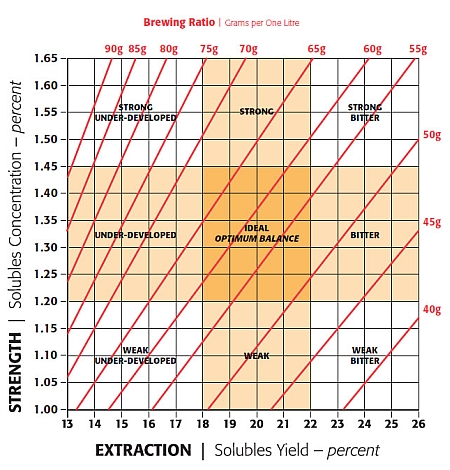
Over here at Decision Science News, we like Engineering All The Things. Accordingly, in an obsessive coffee phase, we acquired:
If you want to experiment, knock yourself out. What the figure above shows is that something around 55 grams of coffee per liter of water is considered ideal, but you can play around in the 50 to 65 grams / liter range. It’s harder to set where you want to be on the red lines without expensive equipment, but generally as you grind the coffee finer and brew longer you move up and to the right.
We have:
- Experimented with the brew temperature from 195 – 205 F (91 – 96 C)
- Experimented with the drinking temperature
- Experimented with 50 to 65 grams of coffee per liter water
- Experimented with the coarseness of the grind, burr, and blade grinders
- Experimented with methods like Aeropress, French press, pourover methods
- Even experimented with fancy coffee, filtered water, etc.
The result of all this informal experimentation on ourselves was not what we were expecting.
The result of all this experimentation was that, for overall taste, the thing that matters most is the temperature at which you drink the coffee. Given that you are making coffee with standard parameter ranges, it all basically tastes the same holding drinking temperature constant.
The effect of cooling on the taste of coffee is substantial. I am not the first one to have noticed this, but it seems to be a rather unappreciated point.
Takeaways:
- Drink it too hot, it tastes like garbage
- Drink it too cold, it tastes like garbage
- Drink it between 130 and 140 F (54 – 60 C) and it tastes amazing
- Within normal ranges, nothing else matters much
Given our admittedly American tastes, this is how we make our coffee (because you’ve got to choose something):
- Coffee maker
- 195 degrees (low brew temps do taste a bit better, see below re: Aeropress)
- 55 grams of coffee / liter water
- Ground so it looks like what you see when opening a can of supermarket coffee
- No milk, no sugar
- Consume at 135 degrees (57 C)
Exception: In all our playing around, we did find that an Americano made using the Aeropress is an amazingly smooth cup of joe. They recommend brewing at about 170 degrees F. We also found that a lower brew temp, even with a coffee maker, does taste smoother.
But drinking temperature matters most.
Figure credit: http://www.engineerjobs.com/magazine/2013/engineering-perfect-cup-coffee.htm
SOCIETY FOR JUDGMENT AND DECISION MAKING NEWSLETTER

The quarterly Society for Judgment and Decision Making newsletter can be downloaded from the SJDM site:
http://sjdm.org/newsletters/
best,
Dan Goldstein
SJDM President & Newsletter Editor
OOPS
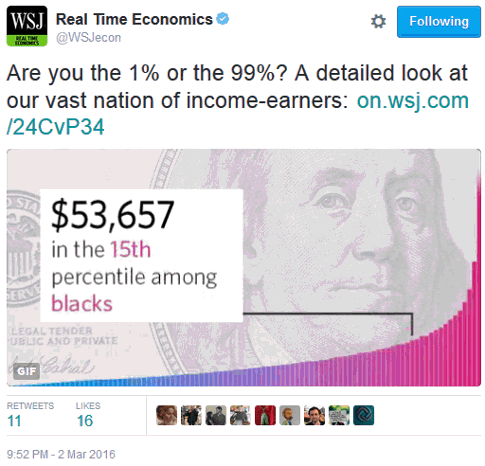
So, we’re on the Twitter and we see this animated GIF from the Wall Street Journal. It says
- $53,647 is the 24th percentile of Americans in 2014
- $53,647 is the 15th percentile among blacks
- $53,647 is the 13th percentile among black women
- $53,647 is the 29th percentile among black women with college degrees
Wait. What?
It says $54k is the 24th percentile of Americans. That means 24% of Americans earn less than $54k. The rest (76%) earn more. Americans are wealthier than I thought.
Then says $54k is the 13th percentile among black women. That means 13% of black women earn less than $54k. The rest (87%) earn more. However, according to the graphic, only 71% of black women with college degrees make more than $54k. So the subset with college degrees earns less than those with or without college degrees?
None of this makes any sense, unless of course you are using the word “percentile” incorrectly. The Xth percentile of a distribution is a value such at X% of the population is at or below that value. If your test score is at the 99th percentile, you’re one percentage point from the top and 99 percentage points from the bottom. If you score is at the first percentile, you’re one percentage point from the bottom and 99 percentage points from the top. Here’s a refresher on percentiles.
The WSJ used the term percentile backwards (100 minus percentile instead of percentile) in their Twitter infographic and they made the same mistake on their website in their Real Time Economics piece What Percent Are You?
Have a look below. With the slider moved to $100k income, the graphic reads “8th percentile”. Nope. That’s the 92nd percentile. 8th percentile: relatively poor. 92nd percentile: relatively wealthy.

The trouble comes, we think from them wanting to say “1 percenter” for the richest one percent. But that doesn’t make it the 1st percentile, which is the lowest income hundredth of the population.
Maybe you don’t believe us because we’re just a crummy little blog and they’re the Wall Street Journal. So we’ll turn it over to the dictionaries:
Merriam Webster’s Dictionary:
a value on a scale of 100 that indicates the percent of a distribution that is equal to or below it
.
American Heritage Dictionary of Student Science:
The percentile of a given value is determined by the percentage of the values that are smaller than that value. For example, a test score that is higher than 95 percent of the other scores is in the 95th percentile.
.
Random House Kernerman Webster’s College Dictionary:
Ninety percent of the values lie at or below the ninetieth percentile, ten percent above it.
.
And just to make sure it’s not an Americanism, here are two English dictionaries from England where they invented English:
Collins English Dictionary:
The 90th percentile is the value of a variable such that 90% of the relevant population is below that value.
.
Oxford Learner’s Dictionary:
Overall these students rank in the 21st percentile on the tests—that is, they did worse than 79 per cent of all children taking the test.
Filed in
Ideas ,
R
 Subscribe
Subscribe to Decision Science News by Email (one email per week, easy unsubscribe)
ANALYSIS OF A LOW-SCORING SPORT
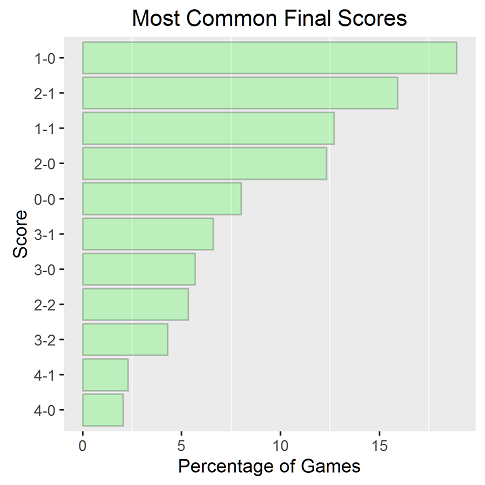
Recently, our friend and co-author Sid Suri predicted that a soccer match would end 2-1. This got us thinking. Suppose you didn’t say which team would score 2 and which would score 1. And suppose people considered you “close” if you got within one goal of 2-1 (so 1-0, 1-1, 2-1, 3-1 or 2-2 would be close). How often would you be close by guessing 2-1?
We’ll save the answer for the end of this post.
To figure this out, we went to http://www.football-data.co.uk and pulled every English soccer match from 1993 to 2016 (so far), for the following leagues: Premier, Championship, League 1, League 2, Conference, Division 1, Division 2, and Division 3. In all: 52,017 matches.
First, let’s establish that soccer is a low-scoring sport. We see below that a two-goal match is the most likely outcome in soccer. The average number of goals per match is 2.6 (median 2).
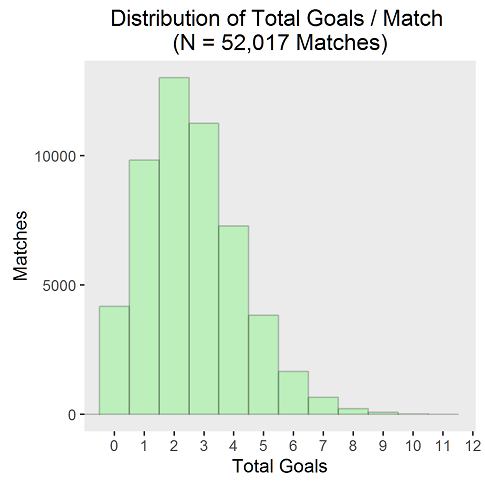
This leads to certain low scores (where a score is a high-low pair) being quite common. The graph at top of this post shows that 1-0 (or 0-1, which is the same thing by our definition) is the most common outcome of a football match there is. Nearly 20% of matches end 1-0.
Now to our key question. What score is just one goal away from the most soccer matches’ scores? It’s close, but the winner is 2-1. 52.9% of matches end within one point of that score. So if you can be vague about who you predict will win, just confidently proclaim that it will end 2-1 and you’ll be right most of the time. Same deal for saying 2-0 or 1-0. All three of these scores are within one point of most soccer matches’ outcomes.
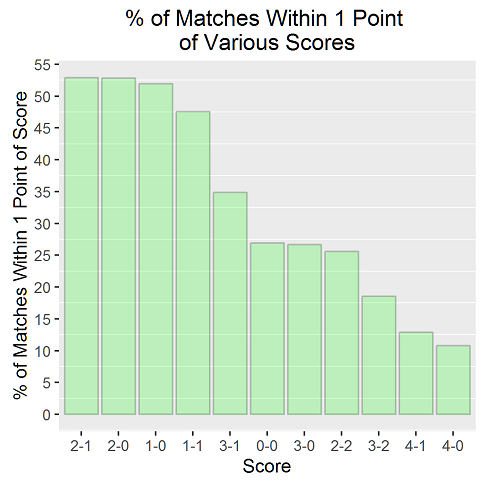
One cute math-y thing about this is that some scores are one point away from more possible scores than others. See below. 2-1 is within one point of five scores (including itself), but 2-0 is only within one point of four possible scores. Same with 1-0. To consider why, realize that scores can’t be negative. Despite being neighbors with fewer scores, 2-0 and 1-0 are within one goal of roughly the same number of matches as 2-1 is. Even 1-1 does quite well with just two neighbors beyond itself.
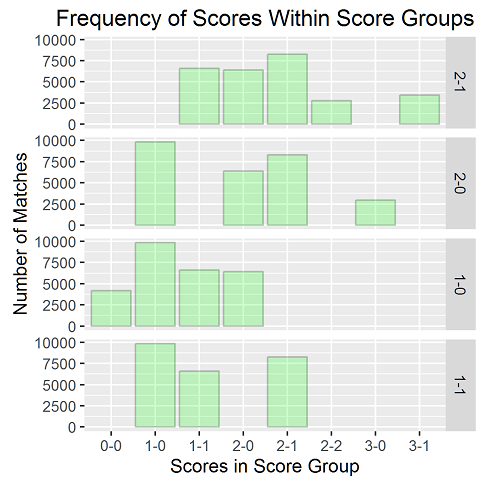
The figure above shows the counts of each of the neighbors of (from top to bottom) 2-1, 2-0, 1-0, and 1-1.
Want to play around more? Here’s R code to play around. Thanks to https://twitter.com/hadleywickham for ggplot, dplyr, httr
Filed in
Conferences
 Subscribe
Subscribe to Decision Science News by Email (one email per week, easy unsubscribe)
DEADLINE SUNDAY 28 FEB, 2016

The 54th meetings will be held at Cal State University in Fullerton, CA, on April 7-9, 2016. It will be held at California State University, Fullerton. Decisions on submissions received by February 28 will be communicated by March 2.
Submissions on all aspects of Judgment and Decision Making are welcome: empirical or theoretical, normative or descriptive, applied or basic, and are NOT limited to Bayes theorem or Bayesian statistics.
In this conference, investigators present research on a variety of topics related to judgment and decision making, including but not limited to:
1) Basic psychological laws of judgment and decision making under conditions of risk, uncertainty, and ambiguity,
2) Cognitive models of judgment and decision making,
3) Applications of JDM theory and models to health care and public policy,
4) Sources of error and variability in judgments and decisions
5) Mathematical and statistical methodology for analyzing behavioral data
6) Medical decision making, legal decision making, and business decision making
7) Expert forecasting
8) Wisdom of crowds
For further information, please visit the conference website:
http://mihaylofaculty.fullerton.edu/sites/dcavagnaro/EdwardsBayes2016/EdwardsBayes2016.htm
The organizers look forward to seeing you in sunny California in April!
BOUNDED RATIONALITY SUMMER SCHOOL APPLICATION DEADLINE MARCH 27, 2016
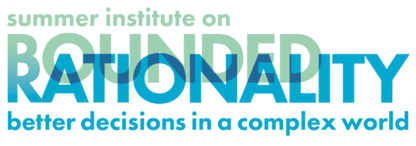
The 2016 Summer Institute on Bounded Rationality will take place on June 27 – July 5, 2016, at the Max Planck Institute for Human Development in Berlin, Germany.
The 15th Summer Institute brings together renowned scientists, talented young researchers and early career practitioners whose aim is to understand and improve decision-making. They should be receptive to crossing disciplinary boundaries and be willing to critically evaluate reigning assumptions in their fields.
The aim is to foster understanding the process and quality of decisionmaking and to apply this knowledge to the real world, enabling people to make better choices for themselves. To this end, it offers a unique forum for decision-making scholars and practitioners from various disciplines to share their approaches, discuss their research and applications, and to inspire each other.
This year’s Summer Institute focuses on how we can understand decision-making in individuals and groups for better environmental, economic, government policy-making, and health choices.
The keynote address will be given by Sir David Spiegelhalter, Winton Professor of the Public Understanding of Risk in the Statistical Laboratory at the University of Cambridge.
The directors of the Summer Institute, Gerd Gigerenzer and Ralph Hertwig, encourage scholars and young practitioners from all fields to apply.
Participation will be free, accommodation will be provided, and travel expenses will be partly reimbursed.
Further information (incl. contact details and application procedure):
https://www.mpib-berlin.mpg.de/en/research/adaptive-behavior-and-cognition/summer-institute-on-bounded-rationality
Deadline for applications: 27 March 2016
Filed in
Gossip ,
Ideas
 Subscribe
Subscribe to Decision Science News by Email (one email per week, easy unsubscribe)
EXPERTS SAID OBAMA WOULDN’T BE ELECTED PRESIDENT AND $3 GAS IS HERE TO STAY

From this article:
Paying less than $3.00 per gallon for gasoline may be automotive history for most Americans, like using 8-track tapes or going to a drive-in movie,” said Bob Darbelnet, President and CEO of AAA. “The reality is that expensive gas is here to stay, which is tough on millions of people who need a car to live their lives. While a few lucky drivers may occasionally pay less than $3.00 per gallon, the national average is likely to remain more costly into the future.
Aaand today’s AAA national average gas price is $1.75.
In an election year, it’s good to keep in mind these quotes about Obama’s prospects in 2008, from this article.
“Barack Obama is not going to beat Hillary Clinton in a single Democratic primary.” — William Kristol
and
“The right knows Obama is unelectable except perhaps against Attila the Hun.” — Mark Penn
and
“Sen. Obama cannot possibly believe, and doesn’t even act as if he believes, that he can be elected president of the United States next year.” — Christopher Hitchens
… and plenty more poor predictions about Obama in 2008 here.
Does this mean humans suffer from a chronic overconfidence bias? We don’t think so. These experts had short term incentives to make predictions, some even had incentives to make bad predictions to impart the illusion of “social proof”. And remember, bad, bold forecasts are amusing because they’re rare.
The takeaway here is that if you don’t want to be called out in the future, don’t sound certain about uncertain things.
Photo credit: https://flic.kr/p/iMsTPi
Filed in
Conferences
 Subscribe
Subscribe to Decision Science News by Email (one email per week, easy unsubscribe)
CROWDSOURCING AND ONLINE BEHAVIORAL EXPERIMENTS 2016, MONTREAL
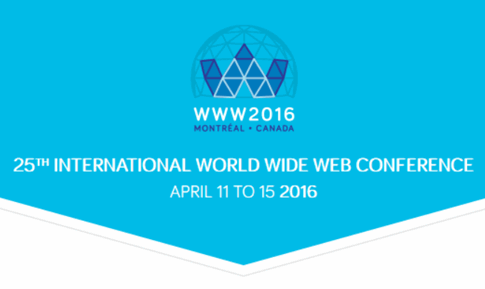
We are pleased to announce the accepted presentations for COBE 2016 (the workshop on Crowdsourcing and Online Behavioral Experiments at the WWW 2016 Conference in Montreal). Thanks to all who contributed!
COBE Website: decisionresearchlab.com/cobe/
Date: April 12th, 2016
Location: A workshop at the WWW 2016 Conference, Montreal, Canada
Accepted papers:
| Time |
Authors |
Title |
| TBA |
Eytan Bakshy, Drew Dimmery and John Myles White |
Design-based Adaptive experimentation |
| TBA |
Andrew Mao |
TurkServer |
| TBA |
Kevin Munger |
Tweetment Effects on the Tweeted: Social Norm Promotion on Online Harassers |
| TBA |
Greg Stoddard |
Guess the Karma: Predicting popularity on Reddit |
| TBA |
Patrick McKnight, Jacob Quartuccio, Michele Saad and David Nicholas |
Response validity in crowdsourcing studies: An empirical investigation into sources of noise |
| TBA |
Tad Hogg and Kristina Lerman |
Disentangling the Effects of Social Signals in Crowdsourcing |
Overview
The World Wide Web has resulted in new and unanticipated avenues for conducting large-scale behavioral experiments. Crowdsourcing sites like Amazon Mechanical Turk, CrowdFlower, Upwork, TaskRabbit, among others, have given researchers access to a large participant pool that operates around the clock. As a result, behavioral researchers in academia have turned to crowdsourcing sites in large numbers. Moreover, websites like eBay, Yelp and Reddit have become places where researchers can conduct field experiments. Companies like Microsoft, Facebook, Google and Yahoo! conduct hundreds of randomized experiments on a daily basis. We may be rapidly reaching a point where most behavioral experiments will be done online.
The main purpose of this workshop is to bring together researchers conducting behavioral experiments online to share new results, methods and best practices.
Topics of Interest
- Crowdsourcing
- Online behavioral experiments
- Online field experiments
- Online natural or quasi-experiments
- Online surveys
- Human computation
Organizing Committee
Siddharth Suri, Microsoft Research NYC
Winter A. Mason, Facebook
Daniel G. Goldstein, Microsoft Research NYC
Program Committee
Alessandro Acquisti, Carnegie Mellon University
Pavel Atanasov, Polly Portfolio
Eytan Bakshy, Facebook
Laura Brandimarte, Carnegie Mellon University
Jesse J. Chandler, Mathematica
Yiling Chen, Harvard University
Nicolas Della Penna, Australian National University
Dean Eckles, MIT Sloan
Alice Gao, University of British Columbia
Sam Gosling, University of Texas at Austin
John Horton, NYU Stern
Eric Johnson, Columbia University
Brian Keegan, Northeastern University
Peter Krafft, MIT
Andrew Mao, Microsoft Research
Akitaka Matsuo, Nuffield College, Oxford University
Gabriele Paolacci, Erasmus University Rotterdam
Eyal Pe’er, Bar-Ilan University
Ragan Petrie, George Mason University
Alexander Peysakhovich, Facebook
David Rand, Yale Unviersity
David Rothschild, Microsoft Research
Sven Seuken, University of Zurich
Sean Taylor, Facebook
Florian Teschner, Karlsruhe Institute of Technology
Jennifer Wortman Vaughan, Microsoft Research
Jens Witkowski, ETH Zurich
Georgios Zervas, Boston University School of Management
Peter Zubcsek, University of Florida Warrington College of Business
Cocktails
As always, you are welcome to enjoy cocktails at the bar with us after COBE in the evening. It’s a tradition!
See you at COBE!
Filed in
Gossip ,
Ideas
 Subscribe
Subscribe to Decision Science News by Email (one email per week, easy unsubscribe)
QUOTATION: THE ACT OF REPEATING ERRONEOUSLY THE WORDS OF ANOTHER – AMBROSE BIERCE

A conference organizer recently reached out to your Decision Science News editor (Dan Goldstein, aka me) asking if they could use the above quote in promotional materials.
I doubted it was my quote. Doesn’t sound like the kind of thing I’d say. But who knows. It does relate to future self stuff, which I do talk about. Perhaps I said it after a few beers and forgot.
After poking around, I figured out it’s a Dan Gilbert quote that got attributed to me, Dan Goldstein. Apart from the fact that Gilbert is a far bigger shot than Goldstein, it’s a forgivable mistake. We’re both Dans. We’re even Daniel Gs. We’re both psychologists, with TED talks, who’ve researched consumer financial decision making. I even spent a semester in Gilbert’s lab.
So one source mixing it up one time is forgivable.
But check this out. The whole Internet has it wrong:
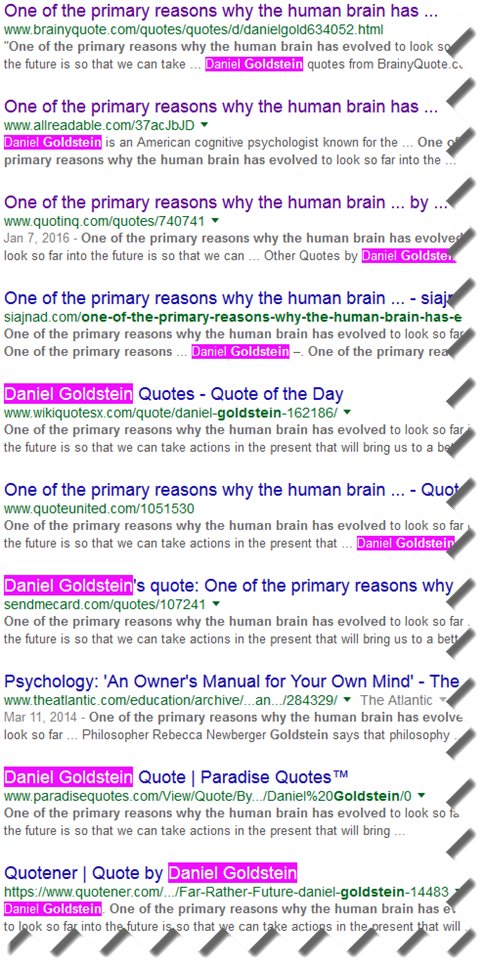
One reason I suspected this wasn’t my quote is that I’m not that good with words. Dan Gilbert, on the other hand, is great with words. Gilbert’s a guy who dropped out of high school to become a professional science fiction writer.
Due to the magic of non-independent errors, the Internet mistakenly believes that I too dropped out of high school to become a science fiction writer.
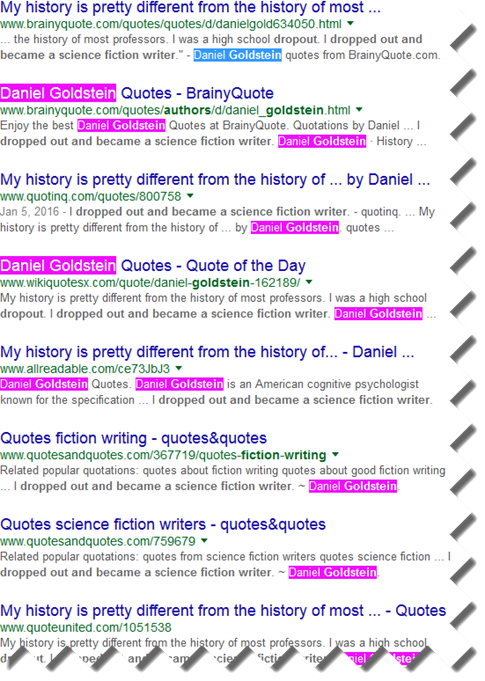
Three things you can quote me on:
- Don’t trust quote websites
- I didn’t say that thing about the brain
- I didn’t drop out of high school to become a science fiction writer
UPDATE
Coincidentally, Dan Gilbert has a paper called You can’t not believe everything you read which suggests that reading an incorrectly attributed quotation might cause you to believe the incorrect attribution. So this blog post may have messed you up. Sorry!
Filed in
Jobs
 Subscribe
Subscribe to Decision Science News by Email (one email per week, easy unsubscribe)
FOUR TENURE TRACK POSITIONS AVAILABLE
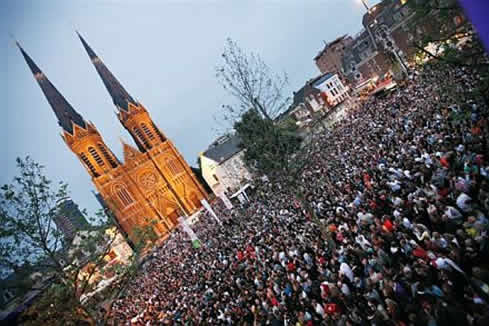
Social proof says go to Tilburg
Start date: May 2016 to September 2016
The Department of Social Psychology at Tilburg University (the Netherlands) is a vibrant group comprised of Social, Economic and Organizational psychologists. Our department fosters an intellectually stimulating and productive environment, advancing knowledge on social decision making and contributing to the effective practices of organizations and society. Our research is highly recognized, both nationally and internationally, in conjunction with the interdisciplinary research institute TIBER (Tilburg Institute for Behavioral Economics Research). The department makes use of diverse and state-of–the-art research facilities (multi-use lab spaces, on-line data collection, mobile computing, psychophysiological and neurocognitive equipment) in addition to a dedicated research support staff (lab assistants, programming and technical support).
Job description and qualifications
Starting September 2016 the department of social psychology participates in a new Dutch bachelor of psychology and a new international bachelor of psychology, both including specific majors on social psychology, economic psychology, and work & organizational psychology. The department’s research program centers on Social Decision Making: Department members seek to understand how individual and interdependent decisions are shaped by social, economic and organizational settings.
Tasks
(1)Research (ca 50%): we expect you to conduct and publish research, write grant proposals, seek connections to stakeholders in the field, and valorize findings.
(2)Teaching (ca 50%): we expect you to supervise students at BSc and MSc level, teach a variety of (English language) courses at both the Bachelors’ and Masters’ level, including the two-year Research Master program, obtain a basic teaching qualification (BKO).
(3)Service: we expect you to contribute to academic citizenship (e.g., regular office hours, participate in weekly lab meetings, colloquia) and management (e.g., member of education committee, lab coordinator, member of ethical committee, etc.).
To further strengthen our teaching and research profile, we seek applicants who
(1) recently completed a PhD in social, economic or organizational psychology,
(2) are willing to teach any course offered by the department,
(3) take preferably an experimental approach to understand social decision making,
(4) have preferably experience with valorizing research findings and/or a good CV to apply for personal grants.
Employment terms and conditions
Tilburg University is rated among the top Dutch employers, offering excellent terms of employment. For the tenure track position there is a 5 years fixed term contract with the possibility of tenure thereafter. The full-time gross salary ranges between € 3400,- and € 4654,- per month (not including various allowances). Employees from outside the Netherlands may qualify for a tax-free allowance equal to 30% of their taxable salary. Tilburg University is an equal opportunity employer.
Information and application
Specific information about the vacancy can be directed to Dr. Ilja van Beest, (professor of social psychology, Head of Department, tel. +31134662472, i.vanbeest@uvt.nl) or Dr. Marcel Zeelenberg, (professor of economic psychology, tel. +31134668381, m.zeelenberg@uvt.nl). Website.
A CV, letter of motivation (including research and teaching statement), teaching evaluations (if available), and one recent publication should be sent before 1 March 2016 to Hans-Georg van Liempd MSc, Managing Director Tilburg School of Social and Behavioral Sciences, Tilburg University (only by using the link below). Interviews, job talks and campus visits with applicants are scheduled in April / May 2016.
Click here to apply
 Subscribe to Decision Science News by Email (one email per week, easy unsubscribe)
Subscribe to Decision Science News by Email (one email per week, easy unsubscribe)

















